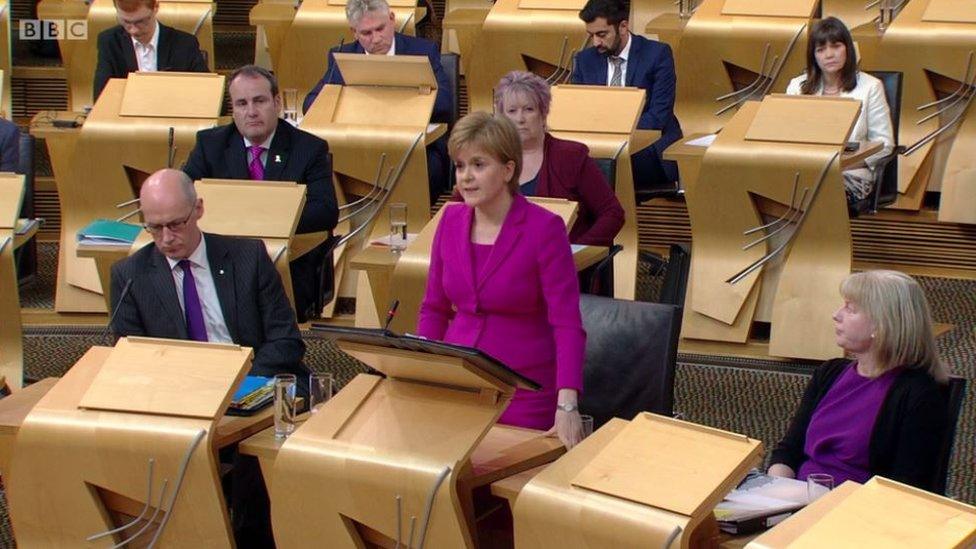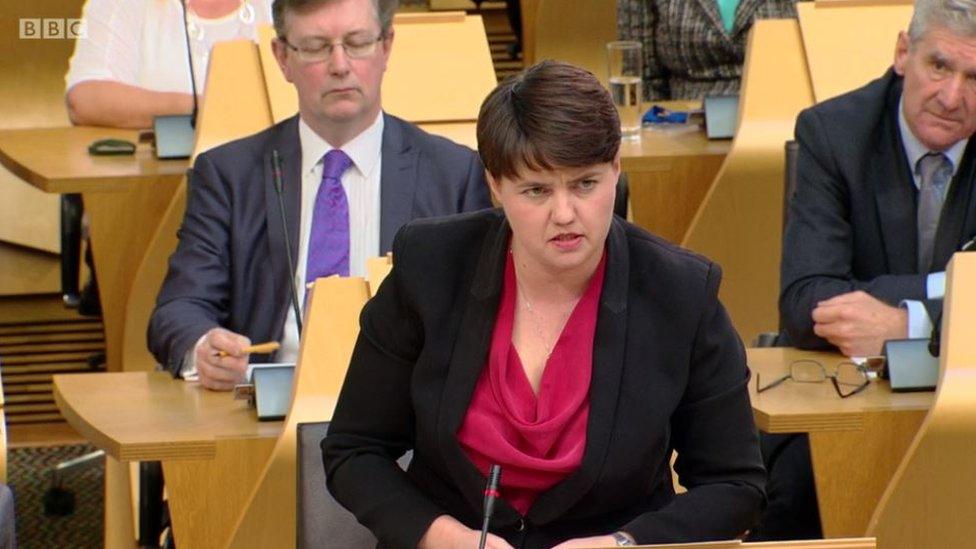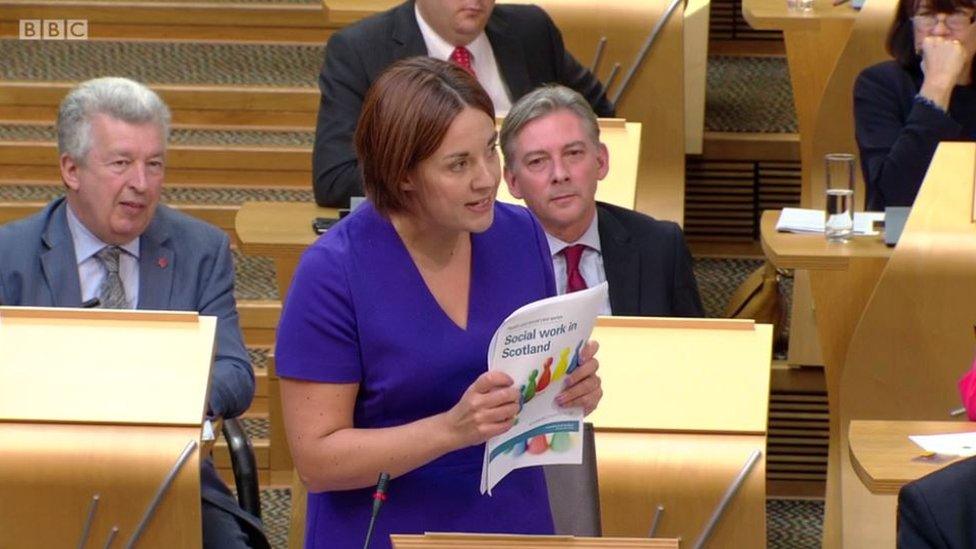FMQSs: challenging choices for Nicola Sturgeon
- Published

Nicola Sturgeon was offered a succession of choices by opposition leaders
To govern, it is frequently said, is to choose. At Holyrood today, Nicola Sturgeon was presented with a succession of notably challenging choices. She coped admirably.
Firstly, Ruth Davidson raised the topic of rape. In particular, she seized upon media reports that, in some instances, crimes of rape had resulted in community sentences rather than prison.
Cue an instant dilemma for Ms Sturgeon. She stressed, repeatedly that the crime of rape should be treated "with the utmost seriousness and severity" by the judicial system.
But then, with comparable gravity, she emphasised that it was not fitting for politicians to pronounce sentences. That was rightly reserved to courts, to the judiciary - who were able to weigh all the circumstances, direct and attendant.
Ms Davidson, the Conservative leader, pursued the topic with commendable assiduity. She noted Ms Sturgeon's point that 93% of rape convictions resulted in a custodial sentence. Which meant, said Ms D, that 7% did not.
Balanced perspective
Plainly, one could not fault her arithmetic. Ms Sturgeon did not seek to do so, rather, she offered once again that balance perspective: rape should be treated with the utmost seriousness, but there must be no derogation from the discretion of the courts.
The exchanges then developed into a discussion of Community Payback Orders more generally. Ms Davidson noted the extent of default in the system. Ms Sturgeon argued that reoffending was lower among those sentenced via CPOs rather than the slammer. Which was a good thing.
I wonder. Are the two events - CPO and reoffending - bound by causality or merely coterminosity? Might it not be the case that CPOs are more commonly handed out to offenders who are already more predisposed to abandon criminal behaviour than their jailed counterparts?

Ruth Davidson raised the topic of community payback orders
In short, is it the CPO that encourages the end of recidivism - or is it the innate nature of the type of offender customarily dealt with through community sentencing?
Either way, this was a thoroughly valuable Parliamentary exchange, ventilating a range of important connected issues - and presenting the First Minister with a challenge. One which she readily recognised and one which she handled with skill.
Ditto the discussion with Kezia Dugdale of the Labour Party - although this tended a little more towards oratorical outrage. Which was no surprise as it was, in essence, a rerun of a core conundrum from the last Holyrood election.
Ms Dugdale began with a note of consensus. The Tories were wicked and bad. (I paraphrase but you get the concept.) Would Ms Sturgeon agree? In particular, would she deplore "Tory spending cuts."
Rather than answering simpliciter, the FM spotted the supplementary in advance. Yes, the Tories were both w. and b. (again, I paraphrase) - but the key thing was to halt them at source. At Westminster. And, at that task, Labour were hopeless.
'Hard-pressed families'
Undeterred, Ms Dugdale pursued her planned supplementary. Should not the FM seek to mitigate cuts by following Labour's prescription? Which, if you will recall, involved using Holyrood's tax powers to increase revenue and thus spending.
Again, the debate ranged more widely - with Ms Dugdale pursuing the topic of spending constraint affecting social care. This, she highlighted rather effectively by depicting the claimed impact upon Scotland's frail elderly.
She accused the FM of amplifying "Tory cuts" by imposing particular strain upon local authority budgets.
To which, Ms Sturgeon had two replies. One, her government was integrating health and social care, with extra cash. Two, it would be wrong to add to "Tory cuts" by imposing tax increases upon hard-pressed families.
As I said, a rerun of the election. But valid and substantive for all that.

Ms Dugdale led her questions on tax powers
And more to come, again posing choices to the FM. Patrick Harvie of the Greens sought detail on planned welfare policy, particularly with regard to obviating sanctions where possible. Ms Sturgeon answered at length and seemingly in depth - although, in practice, she sidestepped the requested precision, stressing instead the need to build Scotland's new devolved social security system, via pending legislation.
To be fair, it is understandable that there is an absence of full detail at this stage. Firstly, the structure. Then the policy.
For the Liberal Democrats, Willie Rennie added one more effective chapter to his narrative demanding support for mental health care, particularly for the young. Ms Sturgeon talked of additional resources and enhanced priority.
Again, to be fair, her instinctive approach would be to back such initiatives. However, it is perhaps also the case that such developments are underpinned - even driven - by parliamentary scrutiny such as that advanced today by Mr Rennie.
Job done.